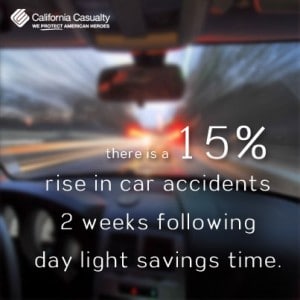There’s a lot of debate about the spring time change; it’s nice to get more daylight but the effects may not be worth it – kids are tired and cranky and many of us are exhausted from losing the hour of sleep. If you are feeling “out of sorts” the week after the change to Day Light Saving (DST), you are not alone. Many sleep experts say messing with our sleep can cause some real health concerns for the heart and the brain.
A 2012 University of Alabama study confirmed the results of an earlier study in Sweden that found a spike in heart attacks the first week of DST.
Numerous studies have shown a 10 to 15 percent rise in traffic accidents the two weeks following the “spring forward” in time.
Educators
Students appear to be affected too. A 2009 study in the journal Sleep Medicine found that, overall, kids were sleepier than usual during the day for three weeks after the time change. The authors of the study suggested that no tests should be given during the first week or two after the switch to DST.
Shift workers – police officers, firefighters, EMTs and nurses – are not immune either.
Tired Blues for the Men and Women in Blue
A study in the Journal of American Medical Association (JAMA) found 40 percent of law enforcement officers had a sleep disorder and just under half admitted to falling asleep while driving, a quarter of those reported doing so at least one or two times per month. The percentage of drowsy driving increased for officers on night shifts. With Daylight Saving and the loss of a precious hour of sleep, already disjointed sleep patterns can be even more affected. The JAMA study concluded that a sleep deprived mind was found to produce officers with a higher rate of reporting serious administrative errors, making safety violations attributed to fatigue, exhibiting anger, falling asleep while driving or during meetings, and absenteeism.
Fatigued Firefighters and First Responders
A study by the International Association of Fire Chiefs (IAFC) warned that that “sleep deprivation [among firefighters] may be responsible for the disproportionally higher fireground injury rates observed early in the morning hours.” It also showed that fatigue when driving may increase the risk of crashes following work hours. Again, switching to DST appears to exacerbate the problem.
Nodding Nurses
Do you know a nurse who isn’t tired? In a study of hospital staff nurses, almost 600 out of 900 surveyed reported at least one episode of drowsy driving and 30 nurses admitted they experienced fatigued driving following every shift they worked. For nurses who worked only night shifts, the percentage rose to almost 80 percent. For many, the time change only makes the problem worse. A sleep deprived mind is not good for patient care and workplace harmony.
Sleep Tips
Here are some possible solutions from WebMD and the American Academy of Sleep Medicine to relieve the effects of DST:
- Expose yourself to bright light during waking hours and no light at nighttime
- Practice good sleep “hygiene:” limit or reduce caffeine and alcohol, create calming rituals before bed to gradually relax and, exercise several hours before bedtime
- Take low doses of melatonin, a substance that helps regulate cycles of sleep
- Take the Monday after the time change off if you feel too sleepy to work or drive
The good news is that within a few weeks, our bodies and brains begin to adjust to the new sleep schedule.
Don’t Forget the Smoke Detectors
This is also the time to replace the batteries in smoke detectors and carbon monoxide alarms. Fire officials say working smoke and carbon monoxide alarms save lives and protect property.
Get Protection
The switch to Daylight Saving, with more tired drivers on the road, should be a reminder that now is a prudent time for a policy review to make sure you have the right auto and home insurance protection at the best value. Call today and talk to a California Casualty advisor at 1.800.800.9410, or visit www.calcas.com.
Read more about the effects of the spring time change at
https://jama.jamanetwork.com/article.aspx?articleid=1104746&resultClick=3
https://www.ncbi.nlm.nih.gov/books/NBK2645/
- California Casualty Earns Financial Stability Rating® of A, Exceptional, From Demotech, Inc. - April 28, 2025
- Music & Arts Grant Recipients – 2024 - December 13, 2024
- Understanding Auto and Home Insurance Rate Changes - December 3, 2024

